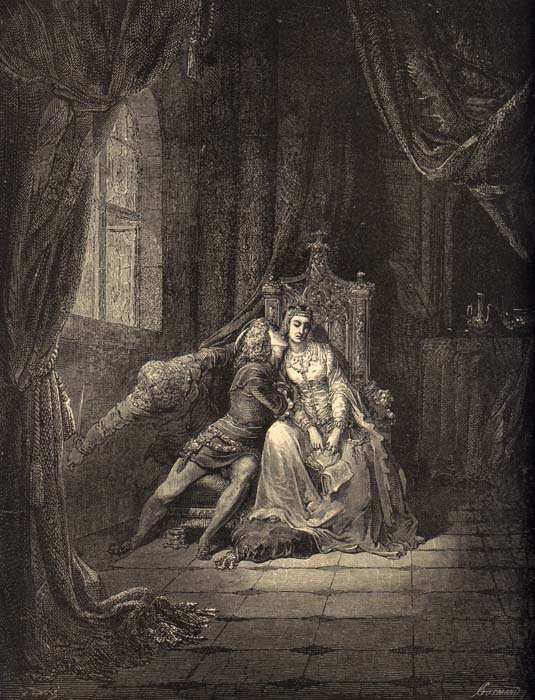The Song of Francesca da Rimini Posted by Serena on Jan 18, 2016 in Culture
Last Thursday I went to the theatre with my friend Annalisa to hear a recital in which the actress Pamela Villoresi, accompanied by a pianist and a soprano, read some of Dante’s work. The recital was based on the theme of Francesca da Rimini, the unfortunate heroine of the Fifth Canto of l’Inferno. In this Canto, Dante enters the second circle of the Inferno, where he finds the souls of those who committed crimes of lust, amongst whom are Paolo and Francesca. Of course, all of this would make far more sense to you if you’d grown up, as is normal here in Italy, with the works of Dante Alighieri. So allow me to give you a brief introduction to the main protagonists.
Francesca da Rimini, the daughter of Guido da Polenta, Lord of Ravenna (in the region of Emilia Romagna), was forced by her father to marry Gianciotto, son of Malatesta, Lord of Rimini, a man of extraordinary courage, but physically deformed. Gianciotto’s brother Paolo, on the other hand, was very good looking and soon he and Francesca fell in love with each other whilst reading together the story of Guinevere and her lover Lancelot of the Knights of the Round Table. Caught in flagrante adulterio (having adulterous relations), Paolo and Francesca were both killed by the enraged Gianciotto.
Having only heard these works of Dante either read out loud at school, where even the most beautiful poems are transformed into silly children’s rhymes, or performed by famous orators in the traditional over dramatised stentorious voice, I must admit that I was initially quite taken aback by Pamela Villoresi’s fresh approach to Dante. She didn’t just read, but brought the characters to life with her voice, giving each of them an individuality that I’d never before heard: Minos, who judged the sinners’ souls and sent them to their appropriate punishment, spoke with a growling serpentine voice, Dante spoke eloquently with a strong Florentine accent, and Francesca, our young heroine, expressed herself in a timid, childish voice with an unmistakable Romagnolo (from the region of Emilia Romagna) accent.
Pamela Villoresi’s recital was interspersed with arias by various composers such as Verdi, Donizetti, and Zandonai, who all wrote pieces inspired by Dante’s poetry. Amongst these compositions was a little gem, an arietta composed by Gioacchino Rossini in 1848 entitled “Il Canto di Francesca da Rimini”, a rarely performed piece taken from lines 127-138 of the Fifth Canto of the Inferno.
Click on the video below to listen to a version sung by the Italian mezzo-soprano Anna Bonitatibus.
“Noi leggiavamo un giorno per diletto
di Lancialotto come amor lo strinse;
soli eravamo e sanza alcun sospetto.
Per più fiate li occhi ci sospinse
quella lettura, e scolorocci il viso;
ma solo un punto fu quel che ci vinse.
Quando leggemmo il disiato riso
esser basciato da cotanto amante,
questi, che mai da me non fia diviso,
la bocca mi basciò tutto tremante.
Galeotto fu ’l libro e chi lo scrisse:
quel giorno più non vi leggemmo avante.”
English translation from the Harvard Classics: The Divine Comedy of Dante Alighieri, translated by Henry F. Cary, 1909–14
“One day,
For our delight we read of Lancelot,
How him love thrall’d. Alone we were, and no
Suspicion near us. Oft-times by that reading
Our eyes were drawn together, and the hue
Fled from our alter’d cheek. But at one point
Alone we fell. When of that smile we read,
The wished smile so raptorously kiss’d
By one so deep in love, then he, who ne’er
From me shall separate, at once my lips
All trembling kiss’d. The book and writer both
Were love’s purveyors. In its leaves that day
We read no more.”

Build vocabulary, practice pronunciation, and more with Transparent Language Online. Available anytime, anywhere, on any device.





Comments:
isa:
Para seu deleite
Geoff:
@isa Ciao Isa, potresti rispondere in italiano o inglese per favore.
Grazie, Serena
Sally jackson:
Thank you for a magic post; fascinating reading, gorgeous aria
JOSEPH:
beautiful thanks
FAY WRIXON:
Thank you so much for sharing Il Can to di Francesca da Rimini. It is quite exquisite. Thank you too for all the time and effort you put into your blog. I am a new devotee and am learning a lot. Grazie Mille…
Geoff:
@FAY WRIXON Grazie per il tuo gentile commento Fay, e benvenuta nel nostro blog!
A presto, Geoff e Serena
Simonetta:
Questo blog e unico; ci permette di esser in contatto con tante idee nuove e interessante.
E ogni volta e diverso.
Tante grazie a voi due, Serena e Geoff, per aprire i nostri occhi e la nostra mente a questa cultura italiana. Sempre ricca! ….e non ancora persa dal …Rinascimento!
Geoff:
@Simonetta Grazie per il tuo gentile commento Simonetta. A presto 🙂
P.S. Love you artwork!